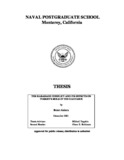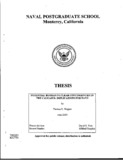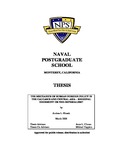The Karabagh conflict and its effects on Turkey's role in the Caucasus

Download
Author
Akdeniz, Bulent.
Date
2001-12Advisor
Tsypkin, Mikhail
Metadata
Show full item recordAbstract
This thesis examines the Karabagh conflict between Azerbaijan and Armenia and its implications on the Caucasus regional security in general and Turkeyαs role in particular. It investigates the causes of the conflict from a theoretical, historical and practical view and evaluates the role of the various international actors in the conflict. This thesis also traces the role of oil and oil politics in resolving the conflict and contrarily examines how the conflict affects the development of the oil in the Caucasus region. This study concludes that the Karabagh conflict and the ensuing events eroded the Turkish role in the Caucasus and created a situation prone to instability and renewed violence. This study provides specific recommendations for Turkish foreign policy makers to enhance the stability in the region without sacrificing Turkish interests. Recommendations include increased relations and engagement with Iran and Russia and the further containment of Armenia until a dramatic change in its attitude is observed.
Rights
This publication is a work of the U.S. Government as defined in Title 17, United States Code, Section 101. Copyright protection is not available for this work in the United States.Collections
Related items
Showing items related by title, author, creator and subject.
-
Potential Russian nuclear contingencies in the Caucasus: implications for NATO
Wagner, Thomas E. (Monterey, California. Naval Postgraduate School, 2000-06);There are three potential Russian nuclear contingencies in the Caucasus that merit analysis: a conflict internal to the Russian Federation; a conflict involving Armenia, Azerbaijan, and/or Georgia; and a conflict involving ... -
The mechanics of Russian foreign policy in the Caucasus and Central Asia: regional hegemony or neo-imperialism?
Hlosek, Andrea L. (Monterey, California. Naval Postgraduate School, 2006-03);Under President Putin, Russias foreign policy has adopted the characteristics of Great Power Normalization, a pragmatic, economically focused model described by Andrei Tsygankov. Its tenets include cooperative economic and ... -
The mechanics of Russian foreign policy in the Caucasus and Central Asia regional hegemony or neo-imperi alism?
Hlosek, Andrea L. (Monterey, CaliforniaNaval Postgraduate School, 2006-03);a refocused foreign policy toward the FSU designed to secure regional hegemony


 01dec_Akdeniz.pdf (1.144Mb)
01dec_Akdeniz.pdf (1.144Mb)
